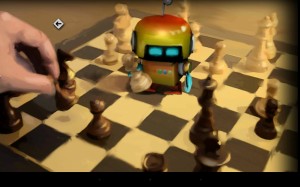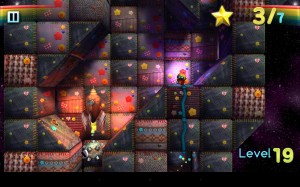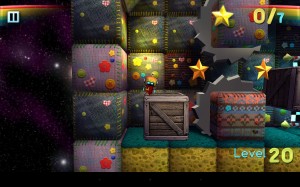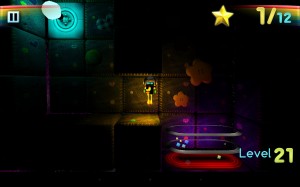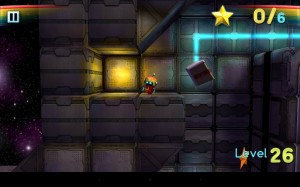Rocket ROBO is puzzle-platform game which manages to provide both charm and, in time, challenge. Young and old alike should be able to appreciate what it has to offer, though by how much remains to be seen.
Once Upon a Time…
The game carries with it a storybook-like aesthetic, which fits the tale of an old tinkerer who lives in a lighthouse in space, built to serve as a beacon for those lost. From that alone, you can tell you’re going to have to suspend disbelief, but that’s okay. To keep him company, he creates a very diminutive robot who would keep him company as they played games and watched the stars in the sky together.
One night, however, the stars cease to appear. Seeing as they are the source of the lighthouse’s power, the elder is disappointed both by the loss of their beauty and his home’s function alike. The tiny Rocket ROBO takes it upon himself to find the stars and return their brilliance for the sake of the one he loves. Clothed in but a small red scarf fashioned for him by the old man, he uses his rockets to take off on his voyage.
The story, simple though it may be, is heartwarming in its storybook-like presentation, and Rocket ROBO himself has a cute, appealing design. The in-game graphics, particularly the first world, are very reminiscent of Media Molecule’s LittleBigPlanet, as it is comprised of a variety of different materials, from types of cloth to sponges and more. The sound of Rocket ROBO’s thrusters is also cute, and the music– though on a seemingly short loop– fits the tone as well.
Simply put: While we’re not saying you have to be into this, you’d have to possess a heart of stone not to find it at least a little endearing in its presentation.
Stars and Spikes (Difficulty Spikes, That Is)
Controls are kind of where things get a little frustrating, though. To activate Rocket ROBO’s thrusters, simply press and hold anywhere on the screen. To move him left or right, you need to tilt the device, and moving in and out of the background in certain sections calls for an upward or downward swipe to move him towards the background or foreground, respectively. This is where things start to fizzle, as the tilt movement isn’t always precise, and you can’t move in or out of the background while your thrusters are going. More irritating than that, though, is that your proximity to a wall can also keep you from moving in or out of the background, and setting yourself just so the game will allow you to do so is a bit of a nuisance.
In the first set of levels, Material World, this isn’t a big problem. Only a handful of obstacles are of any real threat to you over the first 23 levels, and it’s largely easy going. There are a few small bothers, like having your movement and playing area in the background obstructed at times as you fumble around, but it’s all good in the grand scheme of things. Then you reach Material World’s final 24th level, and then the jig is up, the game is afoot, and you wind up with a better idea of what you’re really in for as the world is quickly engulfed in lava and you’re left to wonder how anyone is supposed to be able to finish the level and get all of the stars within before witnessing a horrifying end for little Rocket ROBO.
The second world, the Space Station, changes things up a bit. The backgrounds in this world feel a bit more typical, and the threats are increased considerably, and this is when you begin to question whether or not the controls are really up for the job. By this point, the game begins to feel different from the one you’d been playing until now, for better or for worse.
Space is the Place
Rocket ROBO is a fun game, and as noted, incredibly endearing. Its biggest problem comes in trying to perform quick or precise movements with its controls, which make the game more challenging as it goes, but perhaps not necessarily in the way the developers intended. It’s still playable, don’t be mistaken about that, but it begins to feel more like some sort of compromise as you move further in, and some of it is arguably a little more frustrating than it probably should be. Still, it’s good fun in spite of that, and definitely worth checking out.

